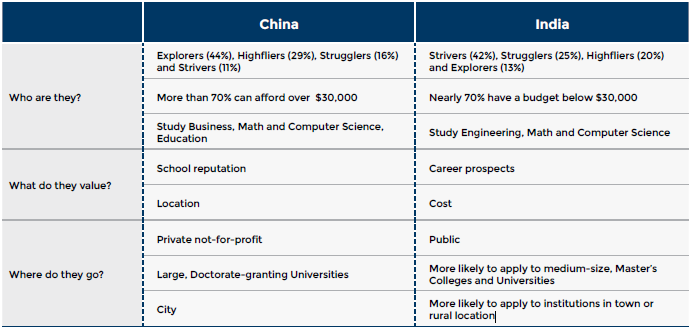
Are you an explorer, high-flyer, struggler or striver?
This identity, which takes into account your financial and academic profile, could determine your priorities when choosing a US university for a master’s degree.
According to a report by World Education Services released last week, almost half of prospective postgraduate Chinese students say that the reputation of a US university is the most important factor in their decision, compared with less than a quarter of prospective Indian applicants.
One Chinese student said: "[Chosen university] is a university with a good ranking and reputation; I've heard about that school ever since I decided to [go] abroad for further study." Others named a university's rank in American college league tables as the most important factor in their decision.
In contrast, 58 per cent of Indian students and 42 per cent of Chinese students rate career prospects as the most important feature of a university.
An Indian student said he chose his university in the United States because it "provided the placement statistics with mean and median salaries of employed current students, and a list of employers' roles offered to students." Another said: "The school I applied to organized seminars and lectures by prominent professionals of various industries."
The differences between Indian and Chinese students are somewhat explained by the different proportions of students fitting into one of the four academic and financial profiles.
Chinese students are unusual in that they are mostly explorers (44 per cent) owing to their high financial resources but low academic preparedness, or high-flyers (29 per cent) owing to high financial resources and high academic preparedness.
Unsurprisingly, the cost of studies is inconsequential for Chinese students when selecting a university for postgraduate study. Only 3 per cent named cost of studies as the most important factor in their decision, compared with 14 per cent of Indian students, 13 per cent of Middle Eastern students and 15 per cent of Latin American students.
Prospective students in India are predominantly either strivers, with low financial resources but high academic preparedness (42 per cent), or strugglers, with both low financial resources and academic preparedness (25 per cent).
Perhaps it is for this reason that Indian students expect a good return on investment on their US education. For each sub-criterion of career prospects – earning potential, university reputation with employers and networking opportunities – more than half of Indian students rated it as a very important consideration in their postgraduate decision.
In line with their ambition, Indian strivers are also very concerned with the level of research and expertise at a university.
"[Chosen university] has got good reputation among prospective employers, and faculty members are renowned with credible research in their respective domain, and yes, fee-structure is very economical," said an Indian student surveyed.

In Latin America and sub-Saharan Africa, where just under half of prospective students are classified as “strivers”, career prospects are also the primary driving force for choosing a US university for a master’s degree.
But Middle Eastern students, whose profiles parallel those of Chinese students, value school reputation over cost, career prospects or location of an institution.
Most prospective students around the world do not consider a university’s location in the US to be the most important factor in their decision. Given the physical (and cultural) distance students will have travelled from Asia, for example, it is understandable that the specific region or city is not important.
The only exception is for Middle Eastern students. A significant number (24 per cent) do value location in the US as the most important characteristic of a prospective university.
This is partly explained by a relatively high percentage of Middle Eastern “explorers”. For them, cost is no barrier, and because of a lack of academic preparedness, a world-leading university is likely to be off-limits. This leaves location as a key consideration.
The research also shows that postgraduate students are likely to end up at a different type of university, in a different type of location, based on where they come from.
European postgraduates in the US have a preference for private colleges, while students from sub-Saharan Africa opt mostly for public universities, often master’s colleges.
Latin American students choose large institutions in major cities as their “reach” universities – ones they may not be quite qualified for – but use smaller universities as their safe back-ups.
The only prospective master’s students who tend to prefer medium-sized suburban universities are from the Middle East.
So, will you break the trend, or conform to your regional, financial and academic profile? With hundreds of US universities to consider, there’s more than enough to satisfy all your priorities, whether or not they fit your profile.





















Have your say